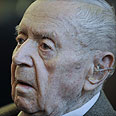

"Suddenly, there were no other Jews left here," she said. It was January of 1942, and hundreds of people, including her beloved brother, were rounded up in the northern Serbian city of Novi Sad by Hungarian forces allied with Germany, shot and thrown into the freezing Danube River.
Seven decades later, it is not too late for the perpetrators to pay, she believes.
A Budapest court decided Thursday that the trial of former Hungarian gendarmerie captain Sandor Kepiro, who is charged with taking part in one of the worst single wartime massacres in the Balkans, could continue. It is certain to be one of the last attempts to bring to justice an alleged perpetrator of Nazi-era war crimes.
Kepiro, Fishl said, must be punished – no matter claims that he cannot follow the hearings. The trial of the 97-year-old was temporarily halted last week over claims that he was partially deaf and mentally incapable of following the court proceedings, which had started a week earlier.
Prosecutors said Kepiro was directly responsible for the deaths of 36 Jews and Serbs, including 30 who were put on a truck on his orders, taken away and shot.
Kepiro, who returned to Budapest in 1996 after living for decades in Argentina, has acknowledged that he participated in the raids, but denied any responsibility in the killings.
"I am innocent and I am here on trumped-up charges," Kepiro said in court. "This trial is a terrible thing. There is no basis to this, everything is based on lies."
"Of course he's guilty – but he's not alone," Fishl countered during an interview in her modest, one-story house, decorated with black and white photos of her lost relatives.
Occupying troops went from house to house, claiming they were looking for communist resistance fighters.
"We were ordered not to leave our homes, keep curtains down, not to look through the windows," Fishl said, wiping tears from her eyes.
"Dead people were lying in the snow, it was a big snow and minus 27 degrees," she said. "God help us ... they took away my 27-year-old brother, his wife and her parents."
"Suddenly, there were no other Jews left here ... In our neighborhood, a family had four sons, and they killed all of them in front of their mother," she said.
She survived only because she lived in a Hungarian-populated Novi Sad neighborhood where Hungarian police officers were less brutal, she said.
Awful crimes
Ana Frenkel, an activist of the Simon Wiesenthal Center, which tracked Kepiro down and listed him as the world's most wanted Nazi, said that after the raid the Jewish population of Serbia's second largest city was reduced to some 200 people.
"Official figures say that during the raid, 1,287 people have been killed including 870 Jews," Frenkel said. "Today's figures say nearly 4,000 people have died."
The presiding judge has asked for a professional medical evaluation of Kepiro's ability to hear. In reply to a question by the judge, Kepiro has said his "mind could not grasp" what was being said in the courtroom.
"Kepiro is a good actor who has perfectly learned his part," Frenkel said. "He certainly doesn't hear well, which is not strange for his age, but he can follow the proceedings quite well."
She said that "the same scenario was seen" during the trial in Germany of retired 91-year-old US autoworker John Demjanjuk for taking part in the murder of tens of thousands of Jews as a Nazi death camp guard. He was sentenced last week to five years in prison, but was set free pending his appeal because of his age.
"I don't have empathy for Kepiro's 97 years, nor Demjanjuk's 91," Frenkel said.
"Both have committed awful crimes, and both have to answer for them," she said. "Kepiro's trial has to send a very important message: Don't do evil, the day will come when you'll be punished for it," Frenkel said.
- Follow Ynetnews on Facebook















